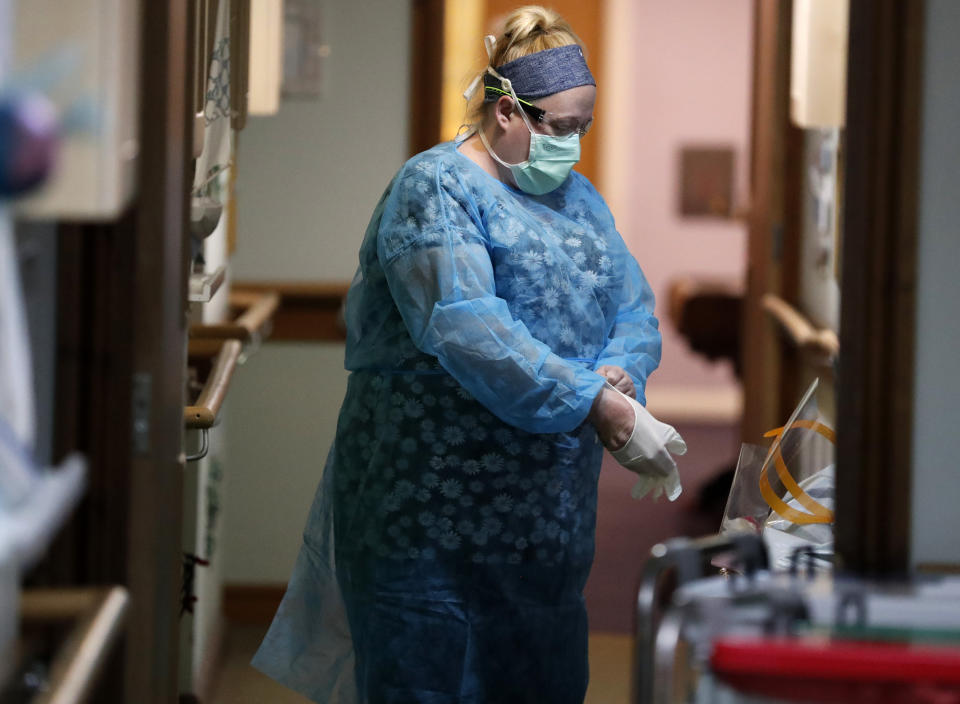Coronavirus: 828 more COVID-19 deaths in UK announced, taking total to 17,337

A total of 17,337 deaths related to coronavirus have been recorded across the UK, a rise of 828, according to the latest Department of Health figures.
There are now also 129,044 confirmed cases, an increase of 4,301.
Earlier, an increase of 778 coronavirus-related deaths in hospitals in England took the total reported since the outbreak began to 15,607 in that country.
NHS England on Tuesday announced the extra deaths of people who tested positive for COVID-19, which included 121 on 18 April, 236 on 19 April and 136 on 20 April.
In the rest of the UK, Scotland has recorded an increase of 70 bringing its total to 985 and Wales reported another 25 for a total of 609. Northern Ireland was yet to post its results.
The figures combined vary from the UK-wide figure given by the Department of Health due to differences in accounting.
Latest coronavirus news, updates and advice
Live: Follow all the latest updates from the UK and around the world
Fact-checker: The number of COVID-19 cases in your local area
6 charts and maps that explain how coronavirus is spreading
Worldwide, there have been more than 2.4 million confirmed coronavirus cases with more than 170,000 deaths related to COVID-19, according to Johns Hopkins University. There have also been more than 658,000 recoveries.
An expert on Monday said he believed the UK had passed the peak of this outbreak.
Oxford University’s professor James Naismith, director of the Rosalind Franklin Institute research centre, added: “The UK has been one of the hardest hit countries in this first wave and we still have to add in deaths from care homes and wider community.
“It is urgent that we learn what can be applied here so we do better.”
Figures from the Office for National Statistics (ONS) also released on Tuesday show there were more than 1,000 deaths in care homes which were not previously reported by the government.
A total of 1,662 deaths related to COVID-19 in England and Wales were registered up to 10 April which happened outside hospitals, the data shows.

Of those, 1,043 took place in care homes, 466 in private homes, 87 in hospices, 21 in other communal establishments and 45 elsewhere.
In total, 13,121 deaths involving COVID-19 happened in England and Wales up to 10 April, and were registered up to 18 April.
This is 41% higher than the 9,288 people whose deaths in UK hospitals were reported by the Department of Health in the same period.
The NHS only records deaths in hospitals where a patient was tested for COVID-19 whereas the ONS records all mentions of COVID-19 on a death certificate, including cases where it was suspected but not confirmed.
Councillor Ian Hudspeth, chairman of the Local Government Association’s community wellbeing board, said: “Today’s sad and shocking figures highlight just what a severe challenge we face in care homes and other community settings.
“Council social care staff and care homes need urgent access to reliable and ongoing supplies of quality PPE, increased rapid and comprehensive testing and greater support with staffing and other equipment, on an equal footing with the NHS.
He added: “We are also yet to see the peak of the stress on the social care system, due to the delay between hospital admissions and discharge, which will require the need to start thinking about shifting capacity across from hospitals and into the community to meet a surge in demand.”
The World Health Organization (WHO) has warned that, despite European countries starting to ease restrictions on populations and passing their initial outbreak peaks, the pandemic is far from over.
WHO director-general Tedros Adhanom Ghebreyesus said: “Trust us. The worst is yet ahead of us.
“Let’s prevent this tragedy. It’s a virus that many people still don't understand.”
Experts have previously warned of the virus’s impact on Africa, where health systems are less developed.

 Yahoo News
Yahoo News 

